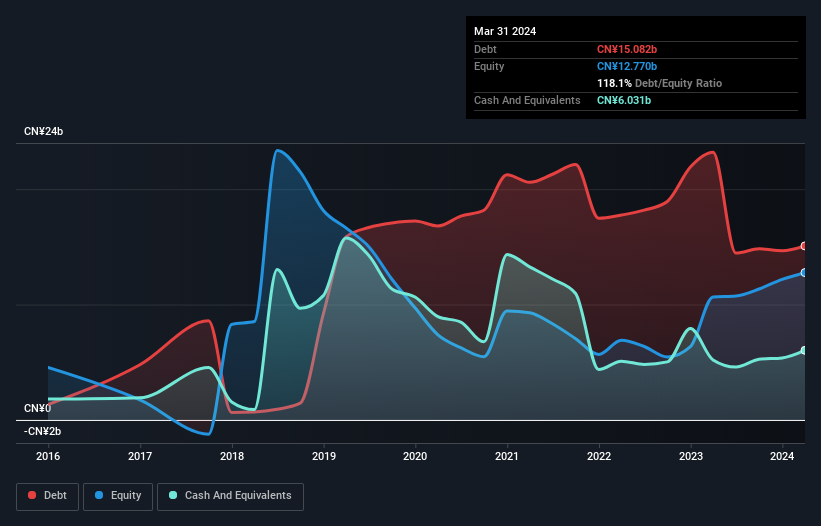David Iben put it well when he said, 'Volatility is not a risk we care about. What we care about is avoiding the permanent loss of capital.' It's only natural to consider a company's balance sheet when you examine how risky it is, since debt is often involved when a business collapses. As with many other companies iQIYI, Inc. (NASDAQ:IQ) makes use of debt. But the real question is whether this debt is making the company risky.
When Is Debt A Problem?
Generally speaking, debt only becomes a real problem when a company can't easily pay it off, either by raising capital or with its own cash flow. Ultimately, if the company can't fulfill its legal obligations to repay debt, shareholders could walk away with nothing. While that is not too common, we often do see indebted companies permanently diluting shareholders because lenders force them to raise capital at a distressed price. Having said that, the most common situation is where a company manages its debt reasonably well - and to its own advantage. The first thing to do when considering how much debt a business uses is to look at its cash and debt together.
View our latest analysis for iQIYI
What Is iQIYI's Debt?
The image below, which you can click on for greater detail, shows that iQIYI had debt of CN¥15.1b at the end of March 2024, a reduction from CN¥23.2b over a year. However, it also had CN¥6.03b in cash, and so its net debt is CN¥9.05b.

How Healthy Is iQIYI's Balance Sheet?
We can see from the most recent balance sheet that iQIYI had liabilities of CN¥23.0b falling due within a year, and liabilities of CN¥10.5b due beyond that. Offsetting this, it had CN¥6.03b in cash and CN¥4.44b in receivables that were due within 12 months. So it has liabilities totalling CN¥23.1b more than its cash and near-term receivables, combined.
This deficit is considerable relative to its market capitalization of CN¥27.5b, so it does suggest shareholders should keep an eye on iQIYI's use of debt. This suggests shareholders would be heavily diluted if the company needed to shore up its balance sheet in a hurry.
We use two main ratios to inform us about debt levels relative to earnings. The first is net debt divided by earnings before interest, tax, depreciation, and amortization (EBITDA), while the second is how many times its earnings before interest and tax (EBIT) covers its interest expense (or its interest cover, for short). Thus we consider debt relative to earnings both with and without depreciation and amortization expenses.
While iQIYI's low debt to EBITDA ratio of 0.85 suggests only modest use of debt, the fact that EBIT only covered the interest expense by 3.6 times last year does give us pause. So we'd recommend keeping a close eye on the impact financing costs are having on the business. It is well worth noting that iQIYI's EBIT shot up like bamboo after rain, gaining 55% in the last twelve months. That'll make it easier to manage its debt. There's no doubt that we learn most about debt from the balance sheet. But ultimately the future profitability of the business will decide if iQIYI can strengthen its balance sheet over time. So if you want to see what the professionals think, you might find this free report on analyst profit forecasts to be interesting.
But our final consideration is also important, because a company cannot pay debt with paper profits; it needs cold hard cash. So it's worth checking how much of that EBIT is backed by free cash flow. During the last two years, iQIYI generated free cash flow amounting to a very robust 92% of its EBIT, more than we'd expect. That positions it well to pay down debt if desirable to do so.
Our View
Happily, iQIYI's impressive conversion of EBIT to free cash flow implies it has the upper hand on its debt. But truth be told we feel its level of total liabilities does undermine this impression a bit. Looking at all the aforementioned factors together, it strikes us that iQIYI can handle its debt fairly comfortably. On the plus side, this leverage can boost shareholder returns, but the potential downside is more risk of loss, so it's worth monitoring the balance sheet. There's no doubt that we learn most about debt from the balance sheet. But ultimately, every company can contain risks that exist outside of the balance sheet. For example, we've discovered 1 warning sign for iQIYI that you should be aware of before investing here.
At the end of the day, it's often better to focus on companies that are free from net debt. You can access our special list of such companies (all with a track record of profit growth). It's free.
Valuation is complex, but we're here to simplify it.
Discover if iQIYI might be undervalued or overvalued with our detailed analysis, featuring fair value estimates, potential risks, dividends, insider trades, and its financial condition.
Access Free AnalysisHave feedback on this article? Concerned about the content? Get in touch with us directly. Alternatively, email editorial-team (at) simplywallst.com.
This article by Simply Wall St is general in nature. We provide commentary based on historical data and analyst forecasts only using an unbiased methodology and our articles are not intended to be financial advice. It does not constitute a recommendation to buy or sell any stock, and does not take account of your objectives, or your financial situation. We aim to bring you long-term focused analysis driven by fundamental data. Note that our analysis may not factor in the latest price-sensitive company announcements or qualitative material. Simply Wall St has no position in any stocks mentioned.
Have feedback on this article? Concerned about the content? Get in touch with us directly. Alternatively, email editorial-team@simplywallst.com
About NasdaqGS:IQ
iQIYI
Through its subsidiaries, provides online entertainment video services in the People’s Republic of China.
Fair value with moderate growth potential.
Similar Companies
Market Insights
Community Narratives



